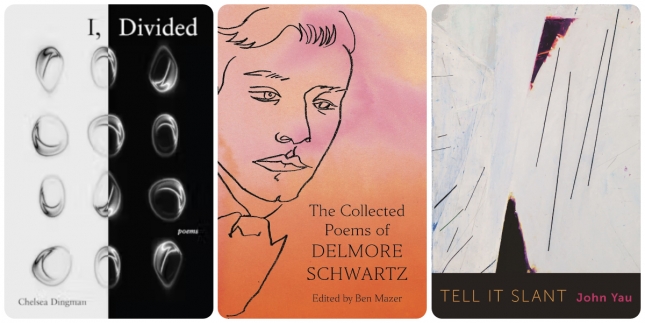New collections to make life more lyrical.

The Independent receives so many wonderful poetry titles every month that it’s just not possible to write at length about them all. So, I thought I’d draw up a quick and dirty list of a few collections I recently enjoyed, but which neither Steven Leyva nor I has reviewed. If you love poetry, you won’t want to miss them.
*****
I, Divided by Chelsea Dingman (LSU Press). Although I read this several months ago, I still can’t shake it off — especially the poems that deal with traumatic brain injury: how such injury impacts a marriage and a family, and how it can rob a person of memory and identity. Dingman explores this subject from multiple angles and in various voices, making this a strong collection.
The Collected Poems of Delmore Schwartz, edited by Ben Mazur (Farrar, Straus and Giroux). With the 1938 publication of In Dreams Begin Responsibilities, Delmore Schwartz was destined for greatness. Championed by T.S. Eliot and Wallace Stevens, he was also the inspiration for Saul Bellow’s Humboldt’s Gift. But his life, and with it his gift, spiraled downward. Suffering from addiction and mental illness, Schwartz died a lonely, undignified death in 1966. Apart from several anthologized poems, such as “The Heavy Bear Who Goes with Me,” his work has largely fallen out of print, but this collection invites us to rethink his legacy. If you buy it just for the 200-page epic, “Genesis,” published here in its entirety for the first time, it will be money well spent. You find you’re in the presence of genius. This will be a great addition to any poetry library.
Tell It Slant by John Yau (Omnidawn). The title is a play on Emily Dickinson’s words when used by this Chinese American poet. These surprising, jarring, and weirdly wonderful poems come from one of our poetry elders. In the first sequence, “Too Far to Write Down,” each poem begins with the plea, “I, humble scribe of clouds, ask permission to make my case…” And make it he does. Yau is a seasoned craftsman, and since he’s also an art critic, there’s a lot of painterly imagery in his work.

Disheveled Histories by Michelle Murphy (Wet Cement Press). These moving and beautifully crafted poems remind me of Fanny Howe. They often inhabit moments just before loss and in its immediate aftermath. A brother is lost to suicide, a mother to dementia, a forest to wildfire. Murphy weaves these losses into something that endures and finds harmony. If time could be stopped, this would be how: by capturing the ephemeral and saving it as language.
Self-Portrait as Othello by Jason Allen-Paisant (Carcanet Poetry). This year’s winner of the T.S. Eliot Prize deserves your attention, but as it’s only published in the U.K., it won’t be easy to find here. Don’t let that deter you, though, because we’ll certainly be hearing more from this extraordinary poet. In this, his second collection, he reimagines Shakespeare’s Othello, giving us an Othello whom Shakespeare wouldn’t recognize, not being Black himself. Allen-Paisant was born in Jamaica and now lives in a largely white world, so he uses the character as a prism through which to see himself and his environment, whether that’s Oxford, Paris, or Venice. You’re in excellent hands from the very first page, and you’ll want to listen to every word.
A Year of Last Things by Michael Ondaatje (Knopf). Who doesn’t love Michael Ondaatje — author of, among many other things, The English Patient? These tender poems invite us into his thoughts, on his southeastern travels, over maps and rivers and mountains, through memories, and across time. “Now we are less. How do we become more,” he writes. His work is lyrical and transcendent. He reflects on fellow poets, and some sequences seem taken directly from his notebooks. There’s a powerful immediacy to them. Reading this collection, I felt like I was stepping into a different state of consciousness for a while.
Amanda Holmes Duffy is a columnist and poetry editor for the Independent and the voice of “Read Me a Poem,” a podcast of the American Scholar.

